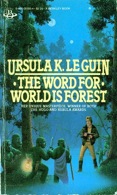
One Fan's Perspective
 |
Ursula K. Le Guin: One Fan's Perspective |

The Word For World is Forest
On a planet twenty-seven light years away from Earth, history is repeating itself. And humanity has a chance to prove that we can get things right. The Hugo award-winning story The Word For World is Forest by Ursula K. Le Guin envisions a newly colonized planet that closely resembles an American Western frontier or a European colonial conquest. Set on a planet similar to Earth, the New Tahiti Colony presents a setting where choices must be made on how to colonize a planet. And maybe this time we can get it right.
The main plot of the story revolves around the relationship between the humans and the local inhabitants called creechies. A group of humans has settled the planet, which they name New Tahiti Colony, and have begun to use it for its wood, since Earth has few trees remaining. The human settlers have enslaved the native creechies and use them as forced labor to cut down the forests. The creechies become angry at the rape and abuse of their people. A creechie named Selver leads an attack that kills more than two hundred humans at a mining camp. It is at this point that the humans, and especially a scientist named Dr. Lyubov, realize that there is a major problem on the island.
The problems of settlement remain central to this story. In a modern version of the wild-west frontier, Le Guin creates a story in which the issues of the pioneers can be examined again. This time, the new frontier is space.The main conflict in this story is the treatment of the natives. A parallel can be drawn between the creechies in the story and the Native Americans. The humans round up all the creechies, destroy their habitat, and force some of them to work. Two characters in the story present different viewpoints to look at the issue. One is Captain Davidson, an old fashioned shoot-‘em-up kind of guy who feels that humans are the superior species and that this gives them a right to exploit the natives. This would have been the attitude of most frontiersmen to the Indians during the settling of the American west. Another, more modern view, is held by Dr. Lyubov. He learns about the creechies and their culture, eventually learning to value them. He even becomes friends with the creechie Selver. He makes every attempt possible to save them. This modern view, inserted by Le Guin, is the one that the reader is made to sympathize with, and the one that will eventually prevail.
Other themes in the story are environmental protection, a theme that occurs in many of Le Guin's works, and dreams. The deforestation on the new planet is alarming because logged areas never regenerate. The creechies also hold the forest in high regard. They live in and around the trees and their word for world means “forest”. Hence, the title of the novel. Dreams and sleep are also themes in the novel. The creechies are vivid dreamers who can control their dreams. Le Guin uses the creechies to question and investigate the differences between real and dream time.
The novel concludes with the humans withdrawing from the planet and promising never to return and bother the creechies. The Earth has learned from history: The peoples and environments you destroy never come back. The Word For World is Forest is a worthy read. It invokes questions and instills hope for the human race. Years down the road, when space travel becomes possible, this should be a must read for all who go out to conquer the last frontier. And even if you’re not a space cowboy, this story is well worth your time.
